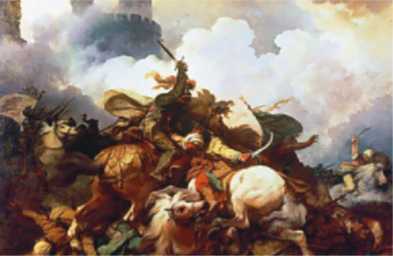Richard was aware that his journey home from the Third Crusade was not going to be easy. He had caused offence to some of the most powerful men in Europe after denying them spoils and marriage alliances, and his brutal conduct was notorious. His route was cut off at several points, eventually forcing him to disembark in the Adriatic and journey across land. He was caught in Vienna, where Austrian Emperor Leopold sold him to German Emperor Henry VI. He was kept prisoner until 4 February 1194, when Eleanor ransomed him for 100,000 marks.
Had been left in charge of the country's security, failed in his task, John leapt at the chance to condemn him and was appointed governor in his place. It was only Eleanor's control over her son that kept outright revolution at bay, but Richard was captured while attempting to return home from the Crusades in November 1192. She oversaw the attempts to free her son, including the raising of ransom money, and she delivered the payment in person to Germany. Perhaps more impressively, she convinced the proud Richard to submit to the Emperor as his vassal to secure his freedom.
Having returned, Richard forgave John and secured his allegiance, but tragedy struck when, in 1199, he was mortally wounded at the siege of Chalus-Chabrol castle. Eleanor rode across France to be at her son's deathbed. John was now king of England, and Eleanor did not let his past actions affect her behaviour.
She helped to secure his kingdom by recruiting mercenaries to crush the rebellion of his grandson Arthur, and securing the territories of her son and herself. She continued to travel in the interests of diplomacy, making a final trip to northern Spain, where she had chosen one of her grandchildren to be the bride of King Philip's son,
Louis. Eleanor lived to the age of 82, continuing to act in the interests of her son and of Aquitaine. When she died, it was a heavy loss to both. Her fiery temperament and fierce protectiveness of her children had propelled Richard I into power and kept John in it. She had been a diplomat and an icon, a prisoner and a patron of the arts, not to mention the most powerful woman in Europe.

Life in the time of Eleanor of Aquitaine




 World History
World History









